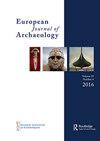不连续中的连续:青铜时代晚期至铁器时代早期的塞浦路斯政治形式
IF 1.2
2区 历史学
0 ARCHAEOLOGY
引用次数: 0
摘要
关于塞浦路斯政治形式从青铜时代晚期到塞浦路斯阿契奇时代的连续性的争论持续不断,造成了学术上的分歧,几乎没有解决的迹象。本文回顾了为塞浦路斯提出的政治形式史学,以此作为这场辩论的基本背景。文章探讨了辩论中出现的几大主题:使用人类学模式进行国家形成、地区主义、社会网络和空间权力的性质。作者认为这场争论集中于两个同样合理的动机:利用相关社会科学理论加强考古学解释和强调塞浦路斯自治。这些动机不必对立起来,它们共同说明了塞浦路斯岛独特的历史,并为充满活力的学术研究提供了基础。本文章由计算机程序翻译,如有差异,请以英文原文为准。
Continuity Within Discontinuity: Cypriot Political Forms from the Late Bronze Age to the Early Iron Age
Debate regarding the continuity of Cypriot political forms from the Late Bronze Age to the Cypro-Archaic is persistent, resulting in a scholarly divide with few signs of resolution. This article reviews the historiography of political forms proposed for Cyprus as the essential context for this debate. It considers several major themes that emerge from the debate: the use of anthropological models for state formation, regionalism, social networks, and the nature of spatial power. The author views the debate as centred on two equally valid motivations: using related social science theory to enhance archaeological explanation and emphasizing Cypriot autonomy. These motivations need not be set in opposition but, together, illustrate the island's unique history and provide the basis for vibrant scholarship.
求助全文
通过发布文献求助,成功后即可免费获取论文全文。
去求助
来源期刊

European Journal of Archaeology
ARCHAEOLOGY-
CiteScore
3.40
自引率
6.70%
发文量
58
期刊介绍:
The publication organ of the European Association of Archaeologists, the European Journal of Archaeology seeks to promote open debate amongst archaeologists committed to a new idea of Europe in which there is more communication across national frontiers and more interest in interpretation. The journal accepts not only new empirical data and new interpretations of the past but also encourages debate about the role archaeology plays in society, how it should be organized in a changing Europe, and the ethics of archaeological practice. All periods are covered; papers, review articles, interviews and short "debate" pieces are all sought. Whilst English is the primary language of publication in the EJA, papers submitted in French or German will be given equal consideration.
 求助内容:
求助内容: 应助结果提醒方式:
应助结果提醒方式:


